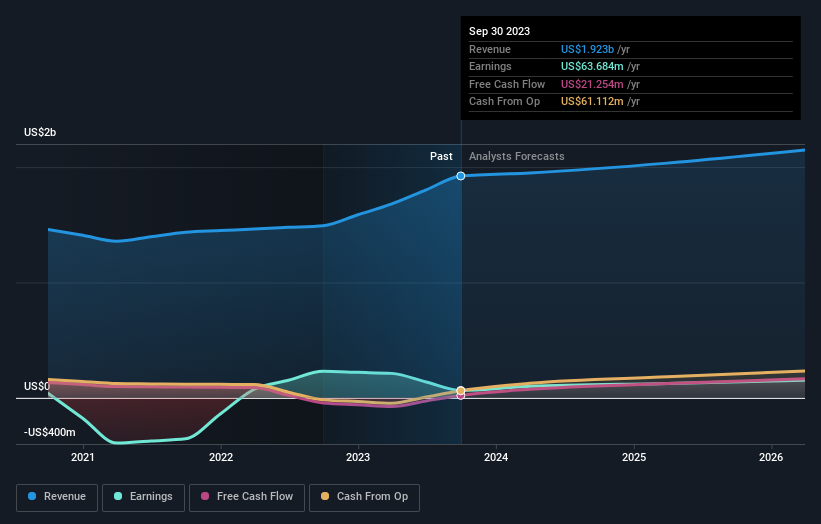Individual investors who have a significant stake must be disappointed along with institutions after Landis+Gyr Group AG's (VTX:LAND) market cap dropped by CHF181m
Key Insights
Significant control over Landis+Gyr Group by individual investors implies that the general public has more power to influence management and governance-related decisions
A total of 16 investors have a majority stake in the company with 51% ownership
Every investor in Landis+Gyr Group AG (VTX:LAND) should be aware of the most powerful shareholder groups. And the group that holds the biggest piece of the pie are individual investors with 38% ownership. That is, the group stands to benefit the most if the stock rises (or lose the most if there is a downturn).
While the holdings of individual investors took a hit after last week’s 8.6% price drop, institutions with their 36% holdings also suffered.
In the chart below, we zoom in on the different ownership groups of Landis+Gyr Group.
See our latest analysis for Landis+Gyr Group
What Does The Institutional Ownership Tell Us About Landis+Gyr Group?
Institutional investors commonly compare their own returns to the returns of a commonly followed index. So they generally do consider buying larger companies that are included in the relevant benchmark index.
Landis+Gyr Group already has institutions on the share registry. Indeed, they own a respectable stake in the company. This suggests some credibility amongst professional investors. But we can't rely on that fact alone since institutions make bad investments sometimes, just like everyone does. It is not uncommon to see a big share price drop if two large institutional investors try to sell out of a stock at the same time. So it is worth checking the past earnings trajectory of Landis+Gyr Group, (below). Of course, keep in mind that there are other factors to consider, too.
Hedge funds don't have many shares in Landis+Gyr Group. Kirkbi Invest A/S is currently the company's largest shareholder with 15% of shares outstanding. In comparison, the second and third largest shareholders hold about 10% and 3.4% of the stock.
Looking at the shareholder registry, we can see that 51% of the ownership is controlled by the top 16 shareholders, meaning that no single shareholder has a majority interest in the ownership.
While studying institutional ownership for a company can add value to your research, it is also a good practice to research analyst recommendations to get a deeper understand of a stock's expected performance. There are plenty of analysts covering the stock, so it might be worth seeing what they are forecasting, too.
Insider Ownership Of Landis+Gyr Group
The definition of company insiders can be subjective and does vary between jurisdictions. Our data reflects individual insiders, capturing board members at the very least. Management ultimately answers to the board. However, it is not uncommon for managers to be executive board members, especially if they are a founder or the CEO.
I generally consider insider ownership to be a good thing. However, on some occasions it makes it more difficult for other shareholders to hold the board accountable for decisions.
It seems insiders own a significant proportion of Landis+Gyr Group AG. It has a market capitalization of just CHF1.9b, and insiders have CHF206m worth of shares in their own names. That's quite significant. It is good to see this level of investment. You can check here to see if those insiders have been buying recently.
General Public Ownership
The general public, who are usually individual investors, hold a 38% stake in Landis+Gyr Group. This size of ownership, while considerable, may not be enough to change company policy if the decision is not in sync with other large shareholders.
Private Equity Ownership
Private equity firms hold a 15% stake in Landis+Gyr Group. This suggests they can be influential in key policy decisions. Sometimes we see private equity stick around for the long term, but generally speaking they have a shorter investment horizon and -- as the name suggests -- don't invest in public companies much. After some time they may look to sell and redeploy capital elsewhere.
Next Steps:
It's always worth thinking about the different groups who own shares in a company. But to understand Landis+Gyr Group better, we need to consider many other factors. Like risks, for instance. Every company has them, and we've spotted 3 warning signs for Landis+Gyr Group (of which 1 makes us a bit uncomfortable!) you should know about.
If you are like me, you may want to think about whether this company will grow or shrink. Luckily, you can check this free report showing analyst forecasts for its future.
NB: Figures in this article are calculated using data from the last twelve months, which refer to the 12-month period ending on the last date of the month the financial statement is dated. This may not be consistent with full year annual report figures.
Have feedback on this article? Concerned about the content? Get in touch with us directly. Alternatively, email editorial-team (at) simplywallst.com.
This article by Simply Wall St is general in nature. We provide commentary based on historical data and analyst forecasts only using an unbiased methodology and our articles are not intended to be financial advice. It does not constitute a recommendation to buy or sell any stock, and does not take account of your objectives, or your financial situation. We aim to bring you long-term focused analysis driven by fundamental data. Note that our analysis may not factor in the latest price-sensitive company announcements or qualitative material. Simply Wall St has no position in any stocks mentioned.

 Yahoo Finance
Yahoo Finance 

